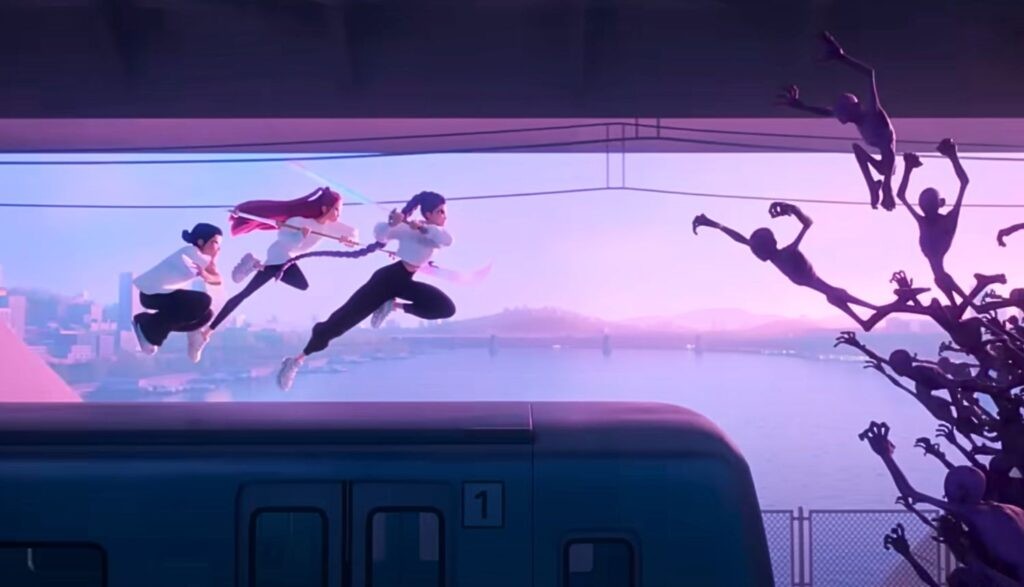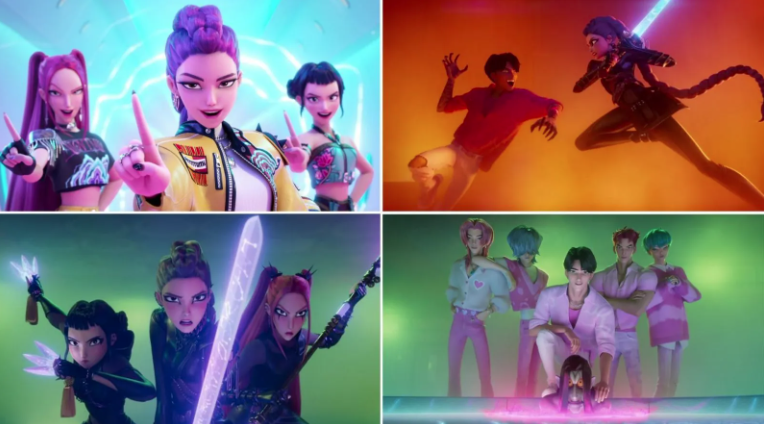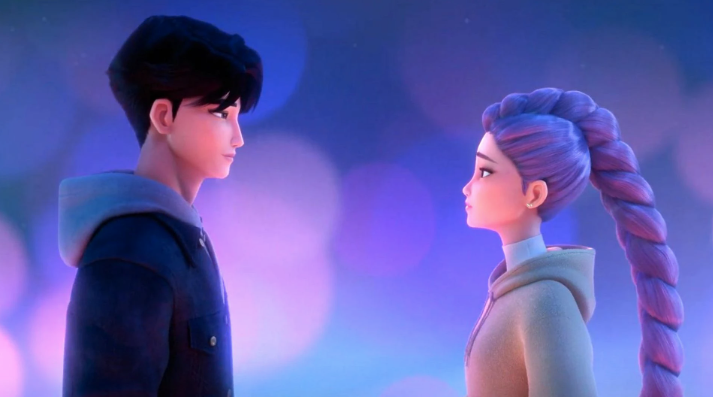By Penny Theodorakopoulou,
Within hours after its debut, K-Pop Demon Hunters shot to the top of the global Netflix charts, enthralling millions of viewers with its unique fusion of dark fantasy excitement and polished idol looks. As audiences hailed the film’s intense choreography, genre-defying soundtrack, and unexpected emotional depth, word-of-mouth and social media chatter drove its quick rise. Fans from South Korea and Latin America stayed to discover all the secrets behind the brilliant performances of Huntrix, a girl group that uses music to fight darkness, in addition to their spectacular demon battles.
Plot overview
KPop Demon Hunters focuses on demon-slaying warriors at night and Huntrix, a prominent K-pop girl group, during the day. The mystical barrier between Earth and the demon realm, the Honmoon, is breached by soul-stealing demons, and Rumi, Mira, and Zoey must balance sold-out concerts with intense combat. Huntrix must use their music-powered magic to save the planet and save their fans when the Saja Boys, a rival boy band, appear as a demonic menace.

From studio to stage: The voices behind the characters
- Rumi – Speaking voice: Arden Cho – Singing voice: EJAE
- Mira – Speaking voice: May Hong – Singing voice: Audrey Nuna
- Zoey – Speaking voice: Ji-young Yoo – Singing voice: REI AMI
- Jinu (Leader of the Saja Boys) – Speaking voice: Ahn Hyo-seop – Singing voice: Andrew Choi
EJAE’s powerful vocals on hits like “How It’s Done” enhance Cho’s assured leadership for Rumi. Audrey Nuna’s heartfelt R&B flare and Mira’s tomboy appeal are grounded by Hong’s audacious tone. REI AMI adds her vibrant energy to each hook, while Yoo embodies Zoey’s vivacious rapper-poet personality. Andrew Choi sings his sensual vocals on songs like “Soda Pop” and “Your Idol,” while Ahn Hyo-Seop makes his English-voice debut as the endearing demon-frontman Jinu. Lastly, I cannot just not comment on EJAE and Andrew Choi’s duo on “Free”, it just brought tears to my eyes!
An earworm extravaganza: The soundtracks that outshine K-Pop
With a soundtrack that many fans believe rivals — if not exceeds — mainstream K-pop releases, K-Pop Demon Hunters attracted attention:
The movie opens with “How It’s Done” (sang by EJAE, Audrey Nuna, and REI AMI), which uses a thundering beat and lyric-driven battle choreography to introduce Huntrix’s magic.
“Golden” (sang by REI AMI, Audrey Nuna, and EJAE): The trio’s unity and stakes are embodied in the triumphant ‘turn the Honmoon gold’ anthem, with its soaring chorus.
“Takedown” (sang by TWICE’s Jeongyeon, Jihyo, and Chaeyoung): This intense song, which is performed by TWICE members as a meta-collaboration, drives the dramatic confrontation.
Sung by the Saja Boys to entice followers away from Huntrix, “Soda Pop” and “Your Idol” (sang by Andrew Choi, Neckwav, Danny Chung, Kevin Woo, and SamUIL Lee) combines pop hooks with a dark undertone.
Finally, we have “Free” (sang by EJAE and Andrew Choi), a song dedicated to one’s understanding for the other, despite their differences — even though they are not that different.
The music feels like K-pop while pushing the genre’s limits thanks to behind-the-scenes producers Teddy Park, Lindgren, and Danny Chung, as well as exceptional compositions by Jenna Andrews and Daniel Rojas.

The plot hole that left us with questions
Even though K-Pop Demon Hunters is definitely a great movie with catchy songs and great voice acting, there are two main plot holes that the movie does not cover —for its own reasons. From that point on, if you don’t want to learn spoilers from the movie, please go see it first!
Let’s start with the biggest plot hole: Rumi’s heritage. Inexplicably, Rumi’s mother, a renowned Hunter, developed feelings for a demon… maybe? Whether their union was based on prophecy, sorcery, or passion is never explained in the movie. What conditions led to Rumi’s birth with both human and demon abilities, and how did their forbidden romance make it beyond the Honmoon’s protective barrier? I really hope we get a second movie for that!
Another plot hole has to do with Jinu’s fate. Jinu was shown to sacrifice himself in the last battle to save Rumi and make amends for his evil loyalty. However, his animal familiars —a tiger and a magpie— are still alive in the final picture. Has Jinu risen above a human form, or is he really dead? His eventual fate is left open by ambiguity. Also, we just want that cut kissing scene in the aquarium!
Prequel/sequel scenarios: What could come next?
Here are two possible (personal) paths for a sequel, considering the movie’s unprecedented Netflix debut, apart from the plot holes that require a sequel:
- The origin of the earliest hunters: The three musical saviors who first created the Honmoon in the 17th century might be the subject of a prequel. What prompted them to use music as a weapon, and what connections did they have with the demon king Gwi-Ma personally?
- The demon bloodline of Rumi: Examining Rumi’s demon father and the politics of the underworld may intensify moral disputes. Will her ancestry lead to a new battle, or may she help to bring the two realms together?
The film’s universe is only starting to take shape, as directors Maggie Kang and Chris Appelhans have hinted to “so many unanswered questions… pockets we can explore.”

K-Pop Demon Hunters achieves a unique fusion of poignant narrative and spectacular spectacle. Its status as a contemporary classic has been solidified by its upbeat soundtrack, superb vocal and vocal performances, and clever blending of dark fantasy and idol culture. From Jinu’s unclear sacrifice to Rumi’s tragic paternity, unsolved mysteries lay the stage for a sequel that promises even more intricate world-building and high emotional stakes.
Every song has dance covers, fan art, and theories created by fan communities outside of the screen. With official OSTs making their way up the world charts and rumors of remixes done by TWICE, K-Pop Demon Hunters‘s enchantment is still very much alive. One thing is certain: this is a phenomenon that will continue to be relevant for years to come, regardless of whether you’re analyzing plot holes or listening to the soundtrack repeatedly.
References
- ‘K-Pop Demon Hunters’ Review: High-Concept Toon Is as Catchy as the Korean Music Phenom That Inspired It. Variety. Available here
- Netflix’s ‘KPop Demon Hunters’ Is the Best K-Pop Demon Hunting Musical Action Comedy Ever Pajiba. Available here
- ‘KPop Demon Hunters’ Review: Singing, Slinging and Slashing. New York Times. Available here
- KPop Demon Hunters Review: I Loved How This Musical Supernatural Anime Combined Genres To Create A Spectacular Show. Screenrant. Available here




